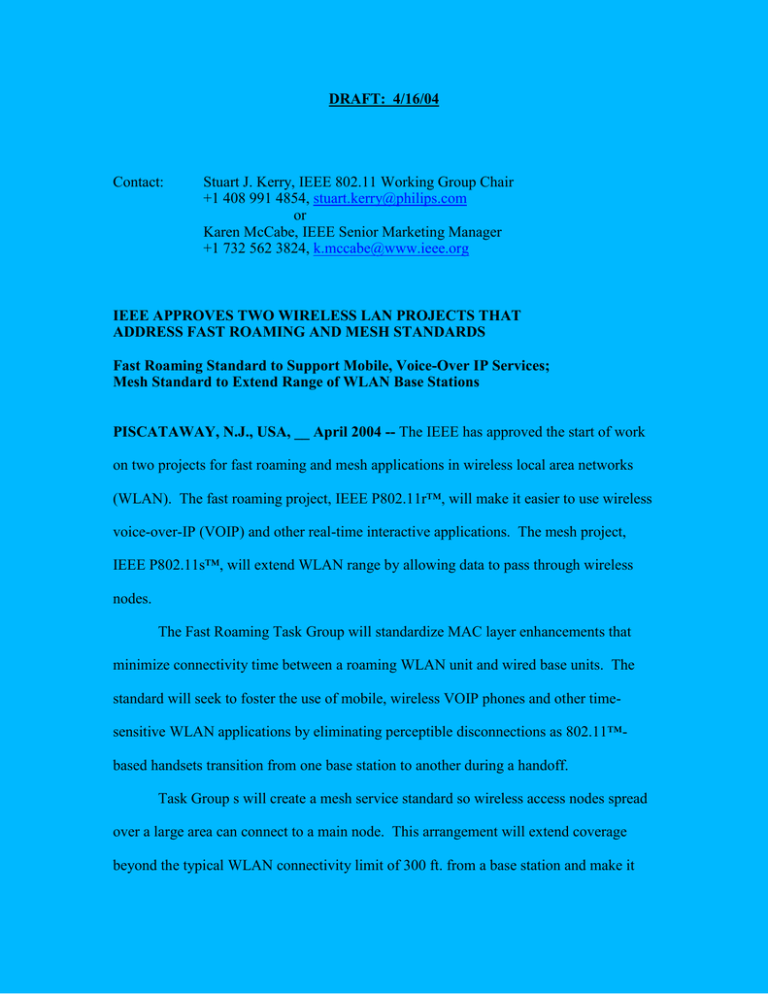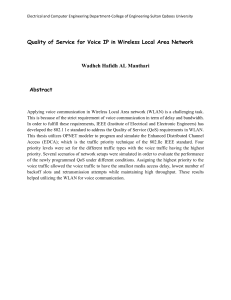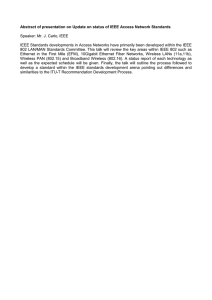DRAFT: 4/16/04 Contact: Stuart J. Kerry, IEEE 802.11 Working Group Chair
advertisement

DRAFT: 4/16/04 Contact: Stuart J. Kerry, IEEE 802.11 Working Group Chair +1 408 991 4854, stuart.kerry@philips.com or Karen McCabe, IEEE Senior Marketing Manager +1 732 562 3824, k.mccabe@www.ieee.org IEEE APPROVES TWO WIRELESS LAN PROJECTS THAT ADDRESS FAST ROAMING AND MESH STANDARDS Fast Roaming Standard to Support Mobile, Voice-Over IP Services; Mesh Standard to Extend Range of WLAN Base Stations PISCATAWAY, N.J., USA, __ April 2004 -- The IEEE has approved the start of work on two projects for fast roaming and mesh applications in wireless local area networks (WLAN). The fast roaming project, IEEE P802.11r™, will make it easier to use wireless voice-over-IP (VOIP) and other real-time interactive applications. The mesh project, IEEE P802.11s™, will extend WLAN range by allowing data to pass through wireless nodes. The Fast Roaming Task Group will standardize MAC layer enhancements that minimize connectivity time between a roaming WLAN unit and wired base units. The standard will seek to foster the use of mobile, wireless VOIP phones and other timesensitive WLAN applications by eliminating perceptible disconnections as 802.11™based handsets transition from one base station to another during a handoff. Task Group s will create a mesh service standard so wireless access nodes spread over a large area can connect to a main node. This arrangement will extend coverage beyond the typical WLAN connectivity limit of 300 ft. from a base station and make it 2 quicker and easier to install WLAN service without hard-wired connections. In a mesh, a single base station can serve a large facility or broad sensor array. Mesh networks can also allow the military to place repeater nodes on mobile units that link to a central point or let a fireman become a node in a communications network in an emergency. "The IEEE 802.11 Working Group is committed to creating standards for all aspects of wireless LAN operation worldwide," said Stuart J. Kerry, Chairman of the IEEE P802.11 standards committee. "Task Groups r and s reflect this commitment. The standards they will develop should help open a variety of new WLAN applications and continue to promote the rapid growth of IEEE 802.11-based wireless systems." New IEEE 802.11 study groups are also being formed for wireless interworking with external networks and wireless network management. These will join the newly created Wireless Performance Prediction Study Group. “I am pleased to see the continued strong industry support for the development of new projects within the Local and Metropolitan Area Networks Standards Committee (LMSC). This new work is an excellent indicator of the vitality of the data communications industry and the important role the IEEE 802 LMSC plays in it,” said Paul Nikolich, Chairman of the IEEE P802 LMSC. IEEE 802.11 standards form a family of specifications that define how WLAN equipment should be produced so equipment from different manufacturers can work together. The standards are developed by the IEEE 802.11 Working Group, which is sponsored by the IEEE 802 LAN/MAN Standards Committee of the IEEE Computer Society. For further information, visit: http://www.ieee802.org. About the IEEE Standards Association 3 The IEEE Standards Association, a globally recognized standards-setting body, develops consensus standards through an open process that brings diverse parts of an industry together. These standards set specifications and procedures based on current scientific consensus. The IEEE-SA has a portfolio of more than 870 completed standards and more than 400 standards in development. Over 15,000 IEEE members worldwide belong to IEEE-SA and voluntarily participate in standards activities. For further information on IEEE-SA, visit: http://standards.ieee.org/. About the IEEE The IEEE has more than 360,000 members in approximately 175 countries. Through its members, the organization is a leading authority on areas ranging from aerospace, computers and telecommunications to biomedicine, electric power and consumer electronics. The IEEE produces nearly 30 percent of the world's literature in electrical and electronics engineering and in computer science. This nonprofit organization also sponsors or cosponsors more than 300 technical conferences each year. Additional information about the IEEE can be found at http://www.ieee.org. # # #

